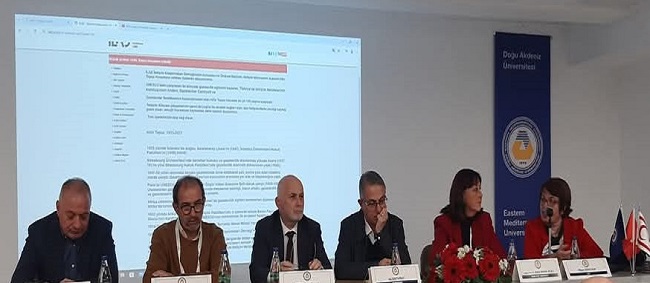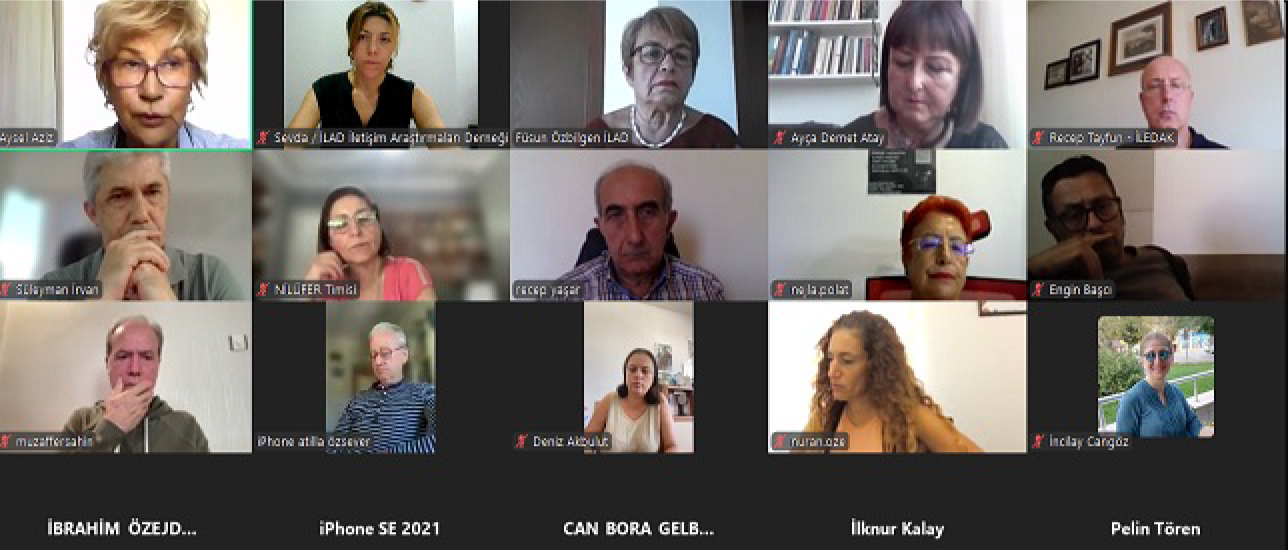Panel in memory of Hıfzı Topuz in Cyprus
In the CIDA24 symposium held at the Eastern Mediterranean University, in memory of Hıfzı Topuz, the Honorary President of İLAD, whom we lost in 2023, “The International Communication Order and the Cyprus Media” was discussed.
A panel was organized in memory of journalist and author Hıfzı Topuz, the founder and honorary president of the İLAD Communication Research Association, at the CIDA 2024 4th International Communication in the Digital Age Symposium hosted by the İLAD Communication Research Association and the İLDEK Communication Faculties Deans Council, hosted by the Eastern Mediterranean University on November 28-30, 2024.
In the panel titled “In Memory of Hıfzı Topuz – The International Communication Order and the Turkish Cypriot Media”. The panel, which was attended by Turkish Cypriot media’s Turkish Agency Cyprus (TAK) Director Fehmi Gürdallı, journalists Ali Baturay and Cenk Mutluyakalı, and academics Assoc. Prof. Dr. Ayça Demet Atay and Asst. Prof. Dr. İbrahim Özejder from Near East University as speakers, was moderated by İLAD Secretary General Füsun Özbilgen.
In her opening speech, Füsun Özbilgen explained the contributions of Hıfzı Topuz, who left our world in 2023, to international journalism education and expressed the efforts he made in the last century for the education of journalists and ethical rules from Black Africa to Asia and the Middle East with his work at UNESCO. She stated that in Turkey, the Press and Broadcasting School was established in Ankara with the contribution of UNESCO for communication education and that the Faculties of Communication were born from this initiative.
Assoc. Prof. Dr. In her speech, Ayça Demet Atay explained Hıfzı Topuz’s work for the democratization of the international communication order and, in her own words, “the end of colonialism in news.” Atay relayed the story of UNESCO’s report titled “Many Voices, One World,” which advocated the establishment of a new communication order in the world, and the MacBride Commission that prepared the report, as told by Hıfzı Topuz in the documentary “On Communication with Hıfzı Topuz,” and said the following: “The report criticized the fact that the global flow of information and news was largely under the control of Western countries. Hıfzı Hoca stated that they opposed colonialism in communication. The report made recommendations to correct the imbalanced structure in the international communication order and to establish a more just order. At that time, the USA and England objected to the report out of concern that they would lose control over the communication order. In Hıfzı Hoca’s words, they tried to sabotage the report and UNESCO. They left UNESCO after the report was accepted at UNESCO’s 21st General Conference. The report, in the words of Hıfzı Hoca, ‘exploded like a bomb in the world’. There were countries that changed the system after being inspired by the report. The right to communicate was included in the constitutions. However, the inequalities in the international communication order continue today. The great influence of major news agencies on the global news flow continues.”
Turkish Cypriot media representatives who spoke at the panel criticized the introverted structure of the Turkish Cypriot media. TAK Director Fehmi Gürdallı said, “Cypriots think they are at the center. Cyprus receives little coverage in the world press. World news is also published little in the Turkish Cypriot press. Local news is prominent.” Also criticizing the journalism education in the country, Gürdallı said, “There is a lack of interest and knowledge among students. They do not follow the right channels and accounts. We need to raise them to be global citizens.”
One of the veteran journalists of the Turkish Cypriot press, Ali Baturay, also said that the Turkish Cypriot media had stopped subscribing to international agencies such as Agence France Presse (AFP) and Reuters because they found them expensive. Stating that some organizations had also stopped subscribing to the Anadolu Agency for the same reason, Baturay said, “The Turkish Cypriot media is not even a member of the Anadolu Agency. There are those who are not members of İHA either. They steal from here and there.” Stating that the Cypriot people are introverted, Baturay noted that readers show little interest in foreign news.
Columnist for the Yenidüzen newspaper, Cenk Mutluyakalı, similar to Baturay, stated that Cyprus has an introverted structure. “Cyprus is very introverted. The Turkish Cypriot community has been outside the international community since 1963. The order we have established is the product of not being recognized. We are isolated from the world,” he said. Explaining that Reuters photographs were used to fill pages in the press in the past, Mutluyakalı said, “No broadcasting institution is a member of international agencies. There is no education for the world. “This is a chicken and egg issue. The reason is education. The society’s turning its face to the world is possible through state policy,” he said.
The last speech in the panel was given by YDÜ Faculty of Communication faculty member Assoc. Prof. Dr. İbrahim Özejder. In his speech, Özejder gave examples of how the international communication order continues to favor the powerful today, and how digital giants such as Google, Meta, X, Microsoft, Apple, and Amazon, the new actors of the order, control a large part of the world’s news and information flow. Özejder stated that digital giants prevent free circulation of news through methods such as censorship, blocking, banning, algorithmic manipulation, and reducing visibility in order to ensure that Western state policies are approved or not questioned, and emphasized that this means contributing to war, destruction, genocide, prejudice, and acts of racism in the world, as in the cases of Ukraine and Palestine. Özejder, who noted that Hıfzı Topuz’s understanding of journalism could be summarized as ‘activities that serve peace, democracy, pluralism, and human rights within countries and around the world, and that provide individuals and peoples with accurate and balanced information’, said that during his student years, his teacher had directed him to research the subject by saying, “I see different things in Cyprus, the Turkish press writes different things” and provided examples from his research.
Özejder concluded his speech by stating that despite all the negativities, it is necessary to find ways to fight for global free news circulation under the guidance of Hıfzı Hoca’s struggle practice.




